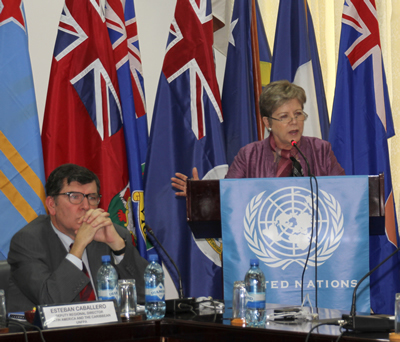Government Representatives and Officials Discussed the Post-2015 Agenda in the Caribbean
Work area(s)
Regional integration was highlighted as a key to regional development.

(12 July, 2013) The medium-term challenges and the shaping of a post - 2015 development agenda in the Caribbean were discussed during the Sixteenth Meeting of the Monitoring Committee of the Caribbean Development and Cooperation Committee (CDCC) of the Economic Commission for Latin America and the Caribbean (ECLAC), in Georgetown, Guyana.
During the High- level meeting, held on 11 July 2013, government representatives and officials discussed three issues. Presentations were made on the outcome of the Caribbean regional preparatory meeting for the 2014 third international conference on Small Island Developing States (SIDS); the consideration of the road map on population, migration and development for the further implementation of the International Conference on Population and Development (ICPD) Programme of Action in the Caribbean; and the Implementation of the Caribbean subregional headquarters of ECLAC 2012-2013 Biennial Programme of Work.
As part of the discussion, Alicia Bárcena, ECLAC Executive Secretary, remarked that the report of the UN High-level Panel to advise on the global development framework beyond 2015 -the target date for the Millennium Development Goals (MDGs) - provides useful guidelines for rethinking development. "It moves beyond the MDGs by stressing the need to integrate economic, social and environmental aspects of development into a coherent strategy", she expressed.
The Caribbean has been part of a number of parallel processes at the international level that will inform the sustainable development agenda. To optimize the benefits from these multiple processes, the subregion needs an organizing framework model to provide direction and consistency in addressing its development challenges.
The Executive Secretary noted that the Caribbean remains highly vulnerable to economic and financial shocks in major markets as evidenced by the recent economic crisis. The SIDS plan of action could be a useful base for a reformed agenda for the subregion. "The SIDS framework would provide the platform for integrating the economic, social and environmental issues into a single coherent sustainable development vision. These structural transformations are central to building a new dynamic Caribbean economy", said Bárcena.
On the 9 and 10 July, delegates of the Forum on Population, Migration and Development met in Guyana to assess the progress made in the subregion towards meeting the objectives articulated in the Cairo Programme of Action. ECLAC convened the meeting in collaboration with the Caribbean Community (CARICOM) and the United Nations Population Fund (UNFPA).
The meeting produced an outcome document entitled The Road Map for Population, Migration and Development beyond 2014, which contained a number of proposals targeted towards reducing poverty and inequality, promoting and protecting the rights of vulnerable groups, such as older persons, adolescents and youth, and persons with disabilities.
Bárcena endorsed the convening of a subregional meeting on the special needs of persons with disabilities, recommended at the 34th Conference of the Heads of Government of the Caribbean Community (CARICOM). Other pertinent issues addressed in the document included achieving universal access to sexual and reproductive health and rights; and for managing migration for development to maximize the benefits and reduce the negative impacts.
These recommendations are the inputs from the Caribbean to the First session of the Regional Conference on Population and Development in Latin America and the Caribbean, to be held in Montevideo, Uruguay, in August 2013 and the UN High - Level Dialogue on International Migration and Development scheduled to take place in October 2013.
Bárcena noted that the middle income classification of Caribbean countries, excluding Haiti, does not sufficiently take account of the high levels of inequality, nor theeconomic, social and environmental vulnerabilities of these States. Given this fact, she said it was critical for these characteristics of the Caribbean to be reflected in the final outcome document for the ICPD beyond 2014 and the post 2015 development agenda.
To keep development issues centre stage, ECLAC proposed the Caribbean Development Roundtable (CDR) as the discussion forum on development challenges and opportunities which would provide practical recommendations that could be considered for implementation by policy makers.
ECLAC Public Information and Web Services Section.
E-mail: prensa@cepal.org; Telephone: (56 2) 2210 2040.
Follow us on: Twitter, Facebook, Flickr and YouTube.
Country(ies)
- Caribbean
Contact
Public Information Unit
- prensa@cepal.org
- (56 2) 2210 2040

